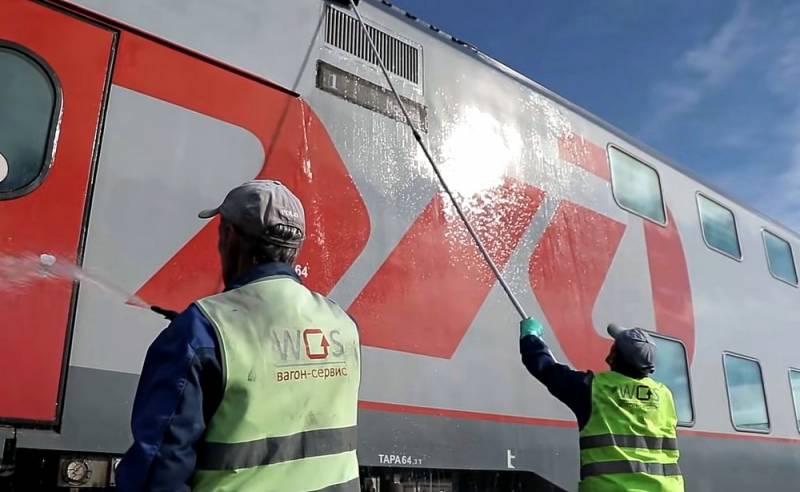Russian Railways: Phenomenon and Problems of Natural Monopoly
Most economists subdivide existing in the world economies three major types of monopolies: closed (state) monopolies, which exist due to legal restrictions associated with protection from possible competition; open, appearing for a relatively short period of time due to the natural situation on the market; natural monopolies that arise in situations where demand is met more efficiently in the absence of competition due to the technological features of production.
In the Russian Federation, the activities of such companies are regulated by the legal norms of Federal Law No. 147 "On Natural Monopolies" dated August 17.08.1995, 6011. This legal act determines the functioning of subjects of natural monopolies in many areas of the economy, including rail transportation. The Federal Antimonopoly Service controls the activities of such enterprises. At the moment, there are XNUMX companies in the register of natural monopolies. In addition, obligations to comply with the requirements of this law may also be imposed on organizations that actually carry out activities provided for by the above-mentioned Federal Law, which has repeatedly led to various conflicts in the final definition of a company as a subject of the natural economy.
If we continue talking specifically about rail transportation, we can come to the conclusion that the creation of several firms in this industry instead of one firm will automatically lead to an increase in production costs and prices, which is disadvantageous neither for the firm, nor for the state authorities, nor for the public interest.
Open Joint Stock Company "Russian Railways" started its activities on October 1, 2003. The sole shareholder and founder of Russian Railways is the Russian Federation. The powers of the shareholder on behalf of the state are exercised by the government of Russia. At the moment, the company is almost an absolute monopolist providing freight and passenger rail transportation services. Russian Railways owns the world's third longest rail network and related infrastructure in the Russian Federation. At the end of 2020, the company and its subsidiaries employed more than 0,8 million people (over 1% of all employed in the domestic economy), which makes the holding the largest employer in the Russian Federation.
President of the country Vladimir Putin in 2022 noted that in modern conditions the company performs the most important functions, working as efficiently as possible, emphasizing that highly qualified people work in the management of the holding, who must be given their due.
It is also worth clarifying that, despite the monopoly position in the railway services market, Russian Railways strives to create a more efficient holding management structure and maintain high standards for the provision of services. The development of the company will contribute to the successful implementation of the entire reform of railway transport in the Russian Federation, which should bring positive results both for the organization itself and for consumers.
However, at the same time, the status of a natural monopoly for Russian Railways is the reason for low competition in the freight transportation market and its virtual absence in the passenger transportation sector in Russia. The main goal of the company, like any commercial organization, is to extract financial profit. Here lies one of the main problems of this economic phenomenon, which consists in the fact that the relevant Federal Law, which was discussed above, imposes various restrictions and social functions on Russian Railways that are not characteristic of business entities. For example, the tariffs for suburban rail transportation, which the company provides, are controlled by regional authorities, when they are set, they try to achieve a balance between social interests and break-even transportation. There is no longer any talk of making a profit here. One of the few legitimate ways to solve this problem can be the creation of subsidiaries by Russian Railways, the establishment of dependent companies allows you to cope with the negative consequences of shifting state responsibilities in the field of social policy.
In addition, at the moment, the domestic railway industry is in dire need of reform for a number of reasons, one of which is precisely the monopoly position of Russian Railways in the market. In Russia, there is a rather low level of technical condition of rolling stock (many wagons and locomotives are subject to replacement due to their long service life and poor technical condition). To solve these problems, it is possible to consider the creation of other state vertically integrated organizations that will be engaged in rail transportation. You can think about the formation of the necessary economic conditions for the emergence of commercial companies at the regional level of rail transport. A rather deplorable situation is also observed with the state of the railway track in some regions, there are actually abandoned roads.
Summing up, it should be emphasized that the implementation of various economic and social programs aimed at the development of Russian Railways is extremely important for the entire domestic economy, since the effective functioning of this company plays a key role in the existence of railway transport in Russia. In addition, it is necessary to improve state regulation in the field of natural monopolies, it should be aimed at improving competitive mechanisms, which will give this sector of the economy a more market character.

Information